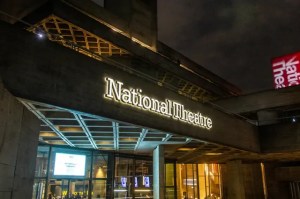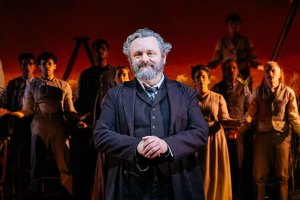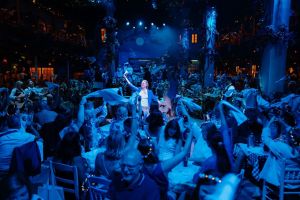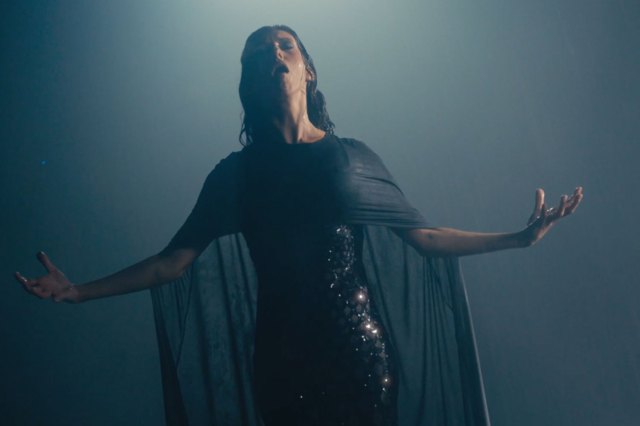Changing of the Guard: Steve Marmion at Soho Theatre
The latest interview in our occasional “Changing of the Guard” series with new artistic directors is with Steve Marmion, who took over from Lisa Goldman at Soho Theatre in July 2010 and has recently embarked on his first full season of work as well as an ambitious building transformation creating two new performance spaces.
Prior to taking on the role of artistic director, Marmion was literary associate at Soho for two years, his directing credits at the venue including Anthony Nielson’s Edward Gant’s Amazing Feats of Loneliness in 2009.
More recently he helmed Macbeth for the Open Air Theatre, Regent’s Park in July 2010 and directed the Lyric Hammersmith’s family Christmas shows Dick Whittington and His Cat and Jack and the Beanstalk with writing team Joel Horwood and Morgan Lloyd Malcolm. He returns to the Lyric to tackle Aladdin this Christmas.
He’s previously been an associate director at the RSC and has worked with the National Theatre, Royal Court, Theatre Royal Plymouth, Theatre Royal Bath, and Sherman Cardiff amongst others.
This summer, directing as Soho artistic director for the first time, Marmion reunites with Neilson for the London debut of Realism, which premiered at the 2006 Edinburgh International Festival. The production, which pulls back the curtain in front of the imagination and fantasies of a normal man, opens on 15 June 2011 (previews from 9 June) and runs until 9 July .
Following Realism, Marmion helms the Soho commission by up-and-coming writer Ed Harris, Mongrel Island from 21 July to 6 August 2011 (previews from 14 July). The show takes a bittersweet, touching and darkly comic look at how the world and workplace invade and manipulate our humanity.
When I first moved to London, Soho was the theatre I was drawn to as the one that both served my taste the most, but also location-wise. And the bar was great. So I’ve probably seen more here than any other theatre in London by coincidence. I’m thinking way back, the first thing might’ve been A Brief History of Helen Troy by Mark Schultz. Wonderful, cracking piece.
Yeah, it’s the vibe of the place, and the fact that this theatre appeals to the audience that appeals to me. It rubs the audience that doesn’t go to the theatre. School stops taking you at about 14, and then you don’t put it back on the list of what you should do tonight until your 30s. It’s that gap that really excites me. Those are people who are forming their views of the world. It will be much harder to change ten years down the line. You stop having political debates because you’ve made your mind up a bit.
Now that’s not true of everyone, but there’s real potential to shape and challenge, to instigate and debate. People aren’t scared of having a debate at 17 or 18. So that audience has always thrilled me, and that’s what Soho Theatre is a leader in getting in. The first way of coming to this theatre is “I fancy a joke”, “oh look there’s a bar”. That’s the first. No barriers, no stone walls up at the theatre. And the second one is, “I recognise him off the panel show, let’s go and see what his stand-up’s like.” So then, once the audience is in, they come out laughing or singing. They start tuning in and maybe cross over.
That to me is that New York model of a theatre. You’ve got different spaces with different activities and then it all collides. That’s what this part of town has been amazing at for hundreds of years, with drink at the centre of it. This fuelled collaboration of wide-eyed ambition and plans for changing the world. And you know, that’s the formula that invented pantomime. The variety troops getting drunk with the comedy troops in the same bars, and “why don’t we do something together?” Then you ended up with panto. No one could’ve invented panto from a blank sheet.
For me a theatre is at its most profound when it has an ongoing conversation with the audience. I began my career in theatre as a director and I’ve worked in an awful lot of theatres around the regions, some national companies, some international companies. For me some element of theatre is about it being tangible, and that might be needing to know what the work does to people. When the whole world comes to go see it and then goes back to its four corners, you can’t tell what difference that play made in any way. When I was in Plymouth I made a piece of work with Kurdish refugees and it was immediately discussed in local council. You saw the dynamic change. Now I’m not suggesting it needs to be worthy work or about accomplishing a political agenda, but to be able to have a longer conversation with an audience than one freelance show is really exciting.
Could be five years, that seems to be the natural lifestyle of an artistic director. First season kicks off now, but the reason for what might look like delay or a long turnaround, is we’ve been busy building two new venues in the theatre. It actually coincided with some ambitions that the theatre had, and there were early architects and visibility checked plans, that coincided with plans I had and we came together to make the best of both worlds.
Yeah, there are going to be three, fully programmed, curated performance spaces, which is a big a jump up. We’re now in a position where we can do six shows a night, and seven on weekends. We essentially turned 150 seats into an 800 seater. Now the economies of scale don’t work on that because you’ve got to sell six shows’ worth of tickets and cast six shows, but 800 seats in a tiny little venue in the West End is quite a feat I think.
Downstairs we’ve got a cabaret space, which is brand new, state of the art, seating 150 people round tables, served whatever they desire while watching the country’s leading comedy cabaret artists. The main theatre will continue to develop the bravest and boldest in new work, often with new writing at its heart, but not exclusively. The new season there begins with a devised Christian rock musical, Operation Greenfield. Then we’ve got the first English production of Realism, followed by a brand new play that’s commissioned by our writer’s development work here and by Ed Harris – both of those directed by me – and then Don Giovanni, our second collaboration with one of the most exciting up-and-coming companies in the country, OperaUpClose. I think that’s a clearer statement that any about what goes in the theatre: “Is it is the most exciting work you can have on the stage?” The answer is yes.
And then the top floor, which is one of the most exciting spaces to me, is dedicated to young people, young companies and emerging talent. One hundred seats, so it’s a decent-sized venue. So that’s for emerging newcomers – really brave, edgy work that might be a bit exposed on a bigger stage. The top floor is where you’ll see the edgy plays and we’ll programme it Wednesday to Saturday. There’s nothing that’s fully hands-on produced by us there. We hope that there may be one in the autumn and then more as we go forward.
In theatre generally, I’m not as interested in black box. I want mini spectacles – and that’s not necessarily saying very commercial. Theatrical spectacle is what makes the audience go “wow”.
It’s about a mixed model of the industry and funding is an essential part of it. I don’t see any point in making the work unless it’s for an audience, but there’s a difference between that, and being a slave to what will get sell seats at the box office. “What can we charge 20 quid for instead of 10 quid?” That’s not interesting, that’s not artistic, that’s not going to change the world. But it’s got to be for the audience. So reduced Arts Council funding is going to be difficult. We’re in a position that keeps us on our toes. But we have a diverse model. The basement comedy and cabaret and the bar, which we now run, will help make up some of the shortfall from the upstairs.
No, making some good plays is my most immediate challenge. We will survive, the arts will always survive. We will find a way of doing it, but it’s about how much we recognise the artist and what they’ve done. As someone who’s worked in other areas of the industry for 15 years, I was so excited to say to someone, “Do you remember those plays you used to do for free? We can now pay you what is the correct rate for your work.”
Do people want to come and see plays here? Do people want to see work here, or come have a drink? Do they want to be associated with us? That would be a measure of success. The great thing about being a theatre director and not a musical theatre director is my photo isn’t anywhere near the programme. People don’t know who I am, so I can do a bit of eavesdropping in the toilet and that will measure my success. But then there’s also the type of artist that wants to engage, the type of actors and writers who want to be working with us, comedians. That tells me too.
Yeah, touring is important to me. And being a home for the best work from the regions is important to me. Simon Stokes and David Prescott at the theatre in Plymouth have been amazing. They’ve been in the process of teaching and developing an audience. We’re so spoiled in London with the amount of theatrical attention we get. So having a two-way relationship with those kinds of companies is very important. Our ambitions are, from the six shows we’ve co-produced in the past year, that the following year one of them will go on tour.
It’s great on a number of levels to do that. I think it’s the tail wagging the dog if that’s the ambition, but you’d be daft not to if you have the right show. If we can have our War Horse, the odds are good. By cutting our funding, you reduce the pallette by which we might be able to control our own destiny.
It’s the greatest, edgiest, most surprising collection of plays that you’ll find in town. There’ll be something here that does it for you.
A few reasons. One was I’d worked with too many bad directors when I was a student, and I knew I wanted to do something in theatre, something with genuine ability to change things, something political. I saw all these different spaces that were not necessarily being used all the time, and I wrote and directed a show about the victims of Hillsborough, which I was at when I was 11. Then I directed it and then it went to Edinburgh. I really enjoyed that process, helping an actor be the greatest they could be in a production and helping a writer to realise the most incredible version of their vision. That’s exciting.
It’s what we’re fighting for. It keeps people alive and gives them a reason to live. If you list great instances of theatre that affected you, you’d run out of fingers. If you listed great films, you could probably use two hands. Great instances of telly, it really starts slipping through your fingers. With theatre, there’s a depth of effect. The depth and profundity of theatre will stay with you for the rest of your life. That’s the difference between listening to the CD and hearing the gig live. That’s a deep effect, that’s something you can’t just throw away.
I think it’s one of the things that we should really be proud about. It’s probably our greatest export around the world and one of the main reasons people come into London is to see what we’re up to now.
It’s not too late to change your mind. You’d be saving pennies if anything, and you’re in danger of costing the world a leading industry for 400 years. We’ll survive, but the thing about human beings is we’re not just survivors, we’re more than that. We do so much more than that. Dogs survive, human beings change things.
– Steve Marmion was speaking to Terri Paddock
Realism opens on 15 June (previews from 9 June) and runs until 9 July, followed by Mongrel Island from 21 July (previews from 14 July) to 6 August 2011. Both are directed by Marmion.












